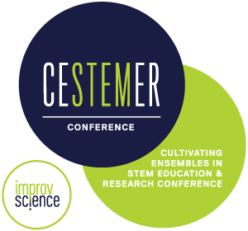 The Cultivating Ensembles in STEM Education and Research (CESTEMER) was held at the Goodman Theater in downtown Chicago on September 15-17, 2017. Initiated by Raquell Holmes and improvscience in 2012, it brings together a diverse mixture of scientists, artists, humanists and performers to discuss and discover new ways of doing science in groups. I attended to share what we’ve been working on at the Ronin Institute, as well as gathering new ideas and strategies for the way forward. There are now many great venues and conferences for discussions on improving science communication, the value of creativity in our workplaces, or integrating the arts and humanities into STEM and education – CESTEMER was about all of those things, but with an added unique emphasis on group performance and play.
The Cultivating Ensembles in STEM Education and Research (CESTEMER) was held at the Goodman Theater in downtown Chicago on September 15-17, 2017. Initiated by Raquell Holmes and improvscience in 2012, it brings together a diverse mixture of scientists, artists, humanists and performers to discuss and discover new ways of doing science in groups. I attended to share what we’ve been working on at the Ronin Institute, as well as gathering new ideas and strategies for the way forward. There are now many great venues and conferences for discussions on improving science communication, the value of creativity in our workplaces, or integrating the arts and humanities into STEM and education – CESTEMER was about all of those things, but with an added unique emphasis on group performance and play.
In addition to the regular talks, poster sessions, and keynotes, all conference attendees had opportunities to participate as performers through games and techniques drawn from theater and improv. This meant the conference was not the usual armchair experience – all conference attendees were co-creators of the performance that was the conference itself. Why is this important? Performance is critical to group learning because of it’s “show, not tell” and experiential nature. To take just one example, the workshop run by Nancy Watt and Carolyn Sealfon “Whose Idea Is It Anyway?” tackled the ownership of ideas in science. Workshop participants grouped together to solve a physics problem and were asked to “play” different characters drawn from several personality types. By experimenting with different characters, we were able to experience how each group solved problems based upon their willingness to build on other’s ideas, embrace mistakes as learning opportunities, share credit and move the collaboration forward.
The intense competition to demonstrate individual “ownership” of an idea often prevails in the academic world (coupled with an artificial scarcity that is perpetuated by the journal prestige system amongst other things) can sometimes lead to an atmosphere of distrust. Therefore the direct experience of the value of empathetic collaboration to produce both better results, as well as unexpected and serendipitous discoveries, through such workshops, will become increasingly invaluable as a means for cultural change in our institutions. This bottom-up approach, coupled with more top-down changes in publications and funding incentives, will, I believe, lead to more durable cultural change than either alone. Plus it’s also a much more fun way of doing science!
I presented a short talk outlining how the Ronin Institute is aiming to foster new ways of thinking of the scientific enterprise as an “ecosystem” of peers. In this ecosystem, scientists collectively empower themselves to build scientific careers in whatever mode or style works for them in the context of the rest of their lives (whether this is in a university setting or elsewhere). I contrasted this ecosystem idea with the usual “pipeline” metaphor that conceives that pursuit of autonomous research requires following one of a set of fairly narrow career paths, controlled by a relatively small number of gatekeepers. I shared the concrete steps we have made in cultivating our own science communities, such as the face-to-face local meetups, participant-driven events like our first Unconference, the virtual meetings: the weekly Tuesday “watercooler” and virtual web research seminars. You can see the slides here:
In summary, CESTEMER was a really fantastic opportunity to generate new “spores” in our evolving ecosystem of science and scholarship. I thank CESTEMER for inviting us, and I’m excited for the Ronin Institute to become part of this conversation. I look forward to all these spores travelling back to each of the participants’ everyday workplaces and spreading the message that we all do our best work when we listen and play together. I plan to attend the next CESTEMER conference in 2019 and I invite anyone interested to join me!
This post is a perspective of the author, and does not necessarily reflect the views of the Ronin Institute.

Pingback:The Ronin Institute at Performing the World in NYC | Ronin Institute